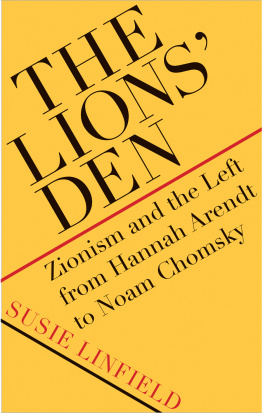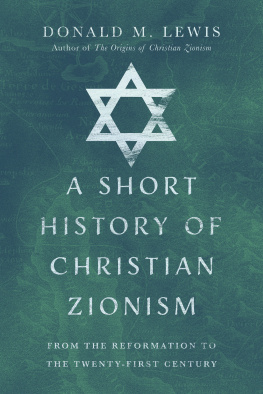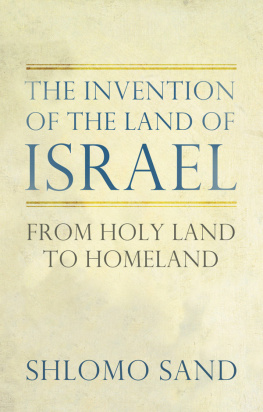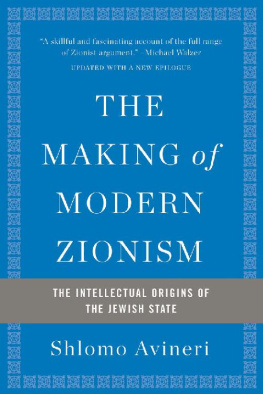Zionism
Short Histories of Big Ideas Series List
Published | Capitalism By Paul Bowles |
Feminism By June Hannam |
Environmentalism By David Peterson del Mar |
Communism By Mark Sandie |
Nationalism By Richard Bosworth |
Terrorism By Rosemary OKane |
Colonialism By Norrie Macqueen |
Modernism By Robin Walz |
Zionism By David Engel |
Available soon | Fascism By Martin Blinkhorn |
First published 2009 by Pearson Education Limited
Published 2013 by Routledge
2 Park Square, Milton Park, Abingdon, Oxon OX14 4RN
711 Third Avenue, New York, NY 10017, USA
Reutledge is an imprint of the Taylor & Francis Group, an informa business
Copyright 2009, Taylor & Francis.
The right of David Engel to be identified as author of this work has been asserted by him in accordance with the Copyright, Designs and Patents Act 1988.
All rights reserved. No part of this book may be reprinted or reproduced or utilised in any form or by any electronic, mechanical, or other means, now known or hereafter invented, including photocopying and recording, or in any information storage or retrieval system, without permission in writing from the publishers.
Notices
Knowledge and best practice in this field are constantly changing. As new research and experience broaden our understanding, changes in research methods, professional practices, or medical treatment may become necessary.
Practitioners and researchers must always rely on their own experience and knowledge in evaluating and using any information, methods, compounds, or experiments described herein. In using such information or methods they should be mindful of their own safety and the safety of others, including parties for whom they have a professional responsibility.
To the fullest extent of the law, neither the Publisher nor the authors, contributors, or editors, assume any liability for any injury and/or damage to persons or property as a matter of products liability, negligence or otherwise, or from any use or operation of any methods, products, instructions, or ideas contained in the material herein.
ISBN 13: 978-1-4058-3556-5 (pbk)
British Library Cataloguing in Publication Data
A CIP catalogue record for this book can be obtained from the British Library
Library of Congress Cataloging in Publication Data
A CIP catalog record for this book can be obtained from the Library of Congress
Set by 35 in 9/15pt Iowan
For Shirley and Harold
WHAT MAKES THE WORLD MOVE? Great men? Irresistible forces? Catastrophic events?
When listening to the morning news on the radio, reading our daily newspapers, following debates on the internet, watching evening television, all of these possibilities and more are offered as explanations of the troubles that beset the world in the Middle East, the war on terror in Iraq and Afghanistan, environmental disasters at Chernobyl or New Orleans, and genocide in Sudan or Rwanda.
Where should we look to find answers to the puzzles of the present? To psychology? To economics? To sociology? To political science? To philosophy? Each of these disciplines offer insights into the personalities and the subterranean forces that propel the events that change the world, and within each of these disciplines there are experts who dissect current affairs on the foundation of these insights.
But all of these events, these problems, and even these disciplines themselves have one thing in common: they have a history. And it is through an understanding of the history of those ideas that inspired the people behind the events, and the ideas behind the ideologies that attempted to explain and control the forces around them that we can comprehend the perplexing and confusing world of the present day.
Short Histories of Big Ideas aims to provide readers with clear, concise and readable explanations of those ideas that were instrumental in shaping the twentieth century and that continue to shape and reshape the present. Everyone who attempts to follow the events of today via newspapers, television, radio and the internet cannot help but see or hear references to capitalism, communism, feminism, environmentalism, nationalism, colonialism and many other isms. And, while most of us probably believe that we have a basic understanding of what these terms mean, we are probably much less certain about who it was that coined, invented or defined them. Even more murky is our understanding of how these concepts moved from an idea to become an ideology and, perhaps, a phenomenon that changed the world. Most bewildering may be the disputes and controversies between factions and divisions within the movements and political parties that claim to be the true followers and the legitimate heirs of those who first conceived of the concepts to which they claim to adhere.
The authors of these Short Histories have been asked to write accessible, jargon-free prose with the goal of making comprehensible to the intelligent, interested but non-expert reader these highly complicated concepts. In each instance the approach taken is chronological, as each author attempts to explain the origins of these ideas, to describe the people who created them and then to follow the twisting path they followed from conception to the present. Each author in the series is an expert in the field, with a mastery of the literature on the subject and a desire to convey to readers the knowledge and the understanding that the research of specialist scholars has produced, but which is normally inaccessible to those not engaged in studying these subjects in an academic environment.
The work of specialists often seems remote, obscure, even pedantic, to the non-specialist, but the authors in this series are committed to the goal of bringing the insights and understanding of specialists to a wider public, to concerned citizens and general readers who wish to go beyond todays headlines and form a more comprehensive and meaningful picture of todays world.
Gordon Martel
Series Editor
TYPE THE WORD ZIONISM into your favourite internet search engine and youll generate somewhere between 500,000 and 1,500,000 links. As contemporary isms go, thats not many: its about the same as youll find for environmentalism or orientalism but only a quarter of the references to liberalism or imperialism, one-fifth of those to feminism or socialism, less than one-tenth of those to capitalism, and a mere 1.5 or 2 per cent of allusions to terrorism. Still, if you could measure the passion, positive and negative, with which the word is usually mentioned, youd be tempted to think that Zionism generates more heat than any other political or social movement today. Indeed, neutral descriptions are hard to find. To its many advocates the name suggests a genuinely democratic and progressive movement of national liberation that has given an oppressed and homeless people the freedom, security and dignity denied it for two thousand years. Its opponents, in contrast, claim that in pursuing their aims Zionists have actually created a new oppressed and homeless people. Moreover, they charge, the sources of Zionism are the same ones that bred western colonialism and racism, meaning that its ideas must be rejected by all right-thinking human beings.











